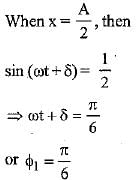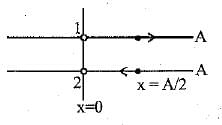NEET Exam > NEET Questions > Two particles are oscillating along two close...
Start Learning for Free
Two particles are oscillating along two close parallel straight lines side by side, with the same frequency and amplitudes. They pass each other, moving in opposite directions when their displacement is half of the amplitude. The mean positions of the two particles lie on a straight line perpendicular to the paths of the two particles. The phase difference is
- a)0
- b)2π/3
- c)π
- d)π/6
Correct answer is option 'B'. Can you explain this answer?
| FREE This question is part of | Download PDF Attempt this Test |
Verified Answer
Two particles are oscillating along two close parallel straight lines ...
Equation of S.H.M. is given by
x = A sin (ωt + δ)
(ωt + δ) is called phase.


For second particle,

x = A sin (ωt + δ)
(ωt + δ) is called phase.


For second particle,

Most Upvoted Answer
Two particles are oscillating along two close parallel straight lines ...
A) 0
When the two particles pass each other at a displacement of half the amplitude, they are in phase with each other. This means that they are both at the same point in their oscillation cycle, and their displacements at that moment are equal and opposite.
Since the mean positions of the two particles lie on a straight line perpendicular to their paths, we can assume that they are both oscillating in a straight line. If they are in phase when they pass each other, this means that they will continue to be in phase as they oscillate back and forth. Therefore, the phase difference between them is always zero.
When the two particles pass each other at a displacement of half the amplitude, they are in phase with each other. This means that they are both at the same point in their oscillation cycle, and their displacements at that moment are equal and opposite.
Since the mean positions of the two particles lie on a straight line perpendicular to their paths, we can assume that they are both oscillating in a straight line. If they are in phase when they pass each other, this means that they will continue to be in phase as they oscillate back and forth. Therefore, the phase difference between them is always zero.
Attention NEET Students!
To make sure you are not studying endlessly, EduRev has designed NEET study material, with Structured Courses, Videos, & Test Series. Plus get personalized analysis, doubt solving and improvement plans to achieve a great score in NEET.

|
Explore Courses for NEET exam
|

|
Similar NEET Doubts
Two particles are oscillating along two close parallel straight lines side by side, with the same frequency and amplitudes. They pass each other, moving in opposite directions when their displacement is half of the amplitude. The mean positions of the two particles lie on a straight line perpendicular to the paths of the two particles. The phase difference isa)0b)2π/3c)πd)π/6Correct answer is option 'B'. Can you explain this answer?
Question Description
Two particles are oscillating along two close parallel straight lines side by side, with the same frequency and amplitudes. They pass each other, moving in opposite directions when their displacement is half of the amplitude. The mean positions of the two particles lie on a straight line perpendicular to the paths of the two particles. The phase difference isa)0b)2π/3c)πd)π/6Correct answer is option 'B'. Can you explain this answer? for NEET 2024 is part of NEET preparation. The Question and answers have been prepared according to the NEET exam syllabus. Information about Two particles are oscillating along two close parallel straight lines side by side, with the same frequency and amplitudes. They pass each other, moving in opposite directions when their displacement is half of the amplitude. The mean positions of the two particles lie on a straight line perpendicular to the paths of the two particles. The phase difference isa)0b)2π/3c)πd)π/6Correct answer is option 'B'. Can you explain this answer? covers all topics & solutions for NEET 2024 Exam. Find important definitions, questions, meanings, examples, exercises and tests below for Two particles are oscillating along two close parallel straight lines side by side, with the same frequency and amplitudes. They pass each other, moving in opposite directions when their displacement is half of the amplitude. The mean positions of the two particles lie on a straight line perpendicular to the paths of the two particles. The phase difference isa)0b)2π/3c)πd)π/6Correct answer is option 'B'. Can you explain this answer?.
Two particles are oscillating along two close parallel straight lines side by side, with the same frequency and amplitudes. They pass each other, moving in opposite directions when their displacement is half of the amplitude. The mean positions of the two particles lie on a straight line perpendicular to the paths of the two particles. The phase difference isa)0b)2π/3c)πd)π/6Correct answer is option 'B'. Can you explain this answer? for NEET 2024 is part of NEET preparation. The Question and answers have been prepared according to the NEET exam syllabus. Information about Two particles are oscillating along two close parallel straight lines side by side, with the same frequency and amplitudes. They pass each other, moving in opposite directions when their displacement is half of the amplitude. The mean positions of the two particles lie on a straight line perpendicular to the paths of the two particles. The phase difference isa)0b)2π/3c)πd)π/6Correct answer is option 'B'. Can you explain this answer? covers all topics & solutions for NEET 2024 Exam. Find important definitions, questions, meanings, examples, exercises and tests below for Two particles are oscillating along two close parallel straight lines side by side, with the same frequency and amplitudes. They pass each other, moving in opposite directions when their displacement is half of the amplitude. The mean positions of the two particles lie on a straight line perpendicular to the paths of the two particles. The phase difference isa)0b)2π/3c)πd)π/6Correct answer is option 'B'. Can you explain this answer?.
Solutions for Two particles are oscillating along two close parallel straight lines side by side, with the same frequency and amplitudes. They pass each other, moving in opposite directions when their displacement is half of the amplitude. The mean positions of the two particles lie on a straight line perpendicular to the paths of the two particles. The phase difference isa)0b)2π/3c)πd)π/6Correct answer is option 'B'. Can you explain this answer? in English & in Hindi are available as part of our courses for NEET.
Download more important topics, notes, lectures and mock test series for NEET Exam by signing up for free.
Here you can find the meaning of Two particles are oscillating along two close parallel straight lines side by side, with the same frequency and amplitudes. They pass each other, moving in opposite directions when their displacement is half of the amplitude. The mean positions of the two particles lie on a straight line perpendicular to the paths of the two particles. The phase difference isa)0b)2π/3c)πd)π/6Correct answer is option 'B'. Can you explain this answer? defined & explained in the simplest way possible. Besides giving the explanation of
Two particles are oscillating along two close parallel straight lines side by side, with the same frequency and amplitudes. They pass each other, moving in opposite directions when their displacement is half of the amplitude. The mean positions of the two particles lie on a straight line perpendicular to the paths of the two particles. The phase difference isa)0b)2π/3c)πd)π/6Correct answer is option 'B'. Can you explain this answer?, a detailed solution for Two particles are oscillating along two close parallel straight lines side by side, with the same frequency and amplitudes. They pass each other, moving in opposite directions when their displacement is half of the amplitude. The mean positions of the two particles lie on a straight line perpendicular to the paths of the two particles. The phase difference isa)0b)2π/3c)πd)π/6Correct answer is option 'B'. Can you explain this answer? has been provided alongside types of Two particles are oscillating along two close parallel straight lines side by side, with the same frequency and amplitudes. They pass each other, moving in opposite directions when their displacement is half of the amplitude. The mean positions of the two particles lie on a straight line perpendicular to the paths of the two particles. The phase difference isa)0b)2π/3c)πd)π/6Correct answer is option 'B'. Can you explain this answer? theory, EduRev gives you an
ample number of questions to practice Two particles are oscillating along two close parallel straight lines side by side, with the same frequency and amplitudes. They pass each other, moving in opposite directions when their displacement is half of the amplitude. The mean positions of the two particles lie on a straight line perpendicular to the paths of the two particles. The phase difference isa)0b)2π/3c)πd)π/6Correct answer is option 'B'. Can you explain this answer? tests, examples and also practice NEET tests.

|
Explore Courses for NEET exam
|

|
Suggested Free Tests
Signup for Free!
Signup to see your scores go up within 7 days! Learn & Practice with 1000+ FREE Notes, Videos & Tests.
























